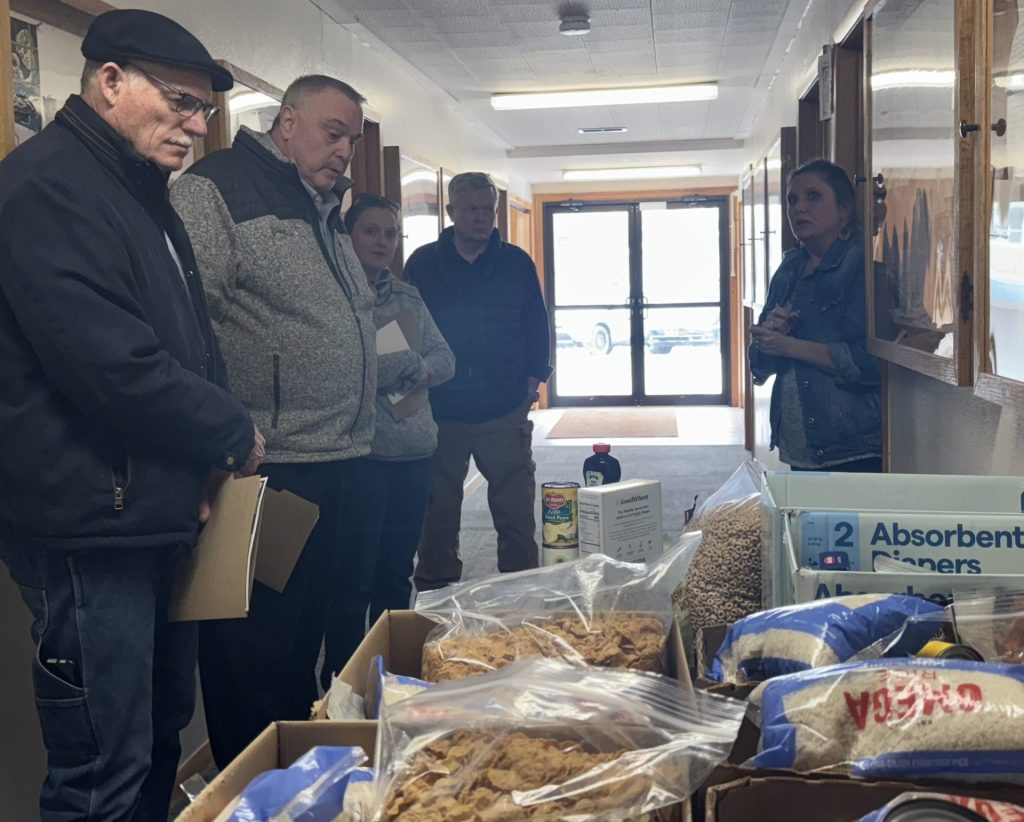
Amanda Rink
Mid-America Publishing
CLARION, Iowa – At first Lutheran’s little red church in Clarion, where the community food pantry is housed, something remarkable is happening. Among the shelves of donated goods and fresh produce, a lesson as old as time itself unfolds, one that Jesus himself spoke of: feeding the hungry.
It is a message that speaks not just as a moral obligation but as a call to action for those with the power to make real change.
That call brought Representative Mark Thompson and Iowa Senator Dennis Guth to Wright County for a firsthand look at the challenges facing rural food systems. Led by local food champions, Jan Libbey, Missy Loux, and Erica Lindaman, the tour highlighted both the struggles and successes of food access initiatives in our area.
For years, Iowa’s food system has worked to connect farmers, food banks, schools, and families in need. But recent cuts to federal funding threaten to upend this delicate balance. The USDA has canceled contracts worth more than $11 million that supported local food purchases for schools, childcare centers, and food banks. For Wright County, where access to nutritious food can already be a challenge, these could have the potential to be deadly.
Missy Loux, local food pantry director, shared during the North Iowa Food Tour that she has already felt the impact of rising food costs and the fear of food restrictions.
The food pantry, which relies on bulk purchases from the Food Bank of Iowa, has seen its purchase power dwindle from 4,000 pounds an order to just 1,500 pounds. The people served, families, seniors, and individuals battling illness, are left in an even more precarious position. One of her clients, a woman with cancer who depends on protein shakes for nutrition, may soon struggle to afford them if politicians like Thompson and Guth vote to restrict food purchases made with SNAP (food stamp) benefits.
Call for Action
The Iowa Food System Coalition (IFSC), represented on the tour by members like Jan Libbey of One Step at a Time Gardens and Andrea Evelsizer of Healthy Harvest of North Iowa, is working to chart a sustainable course forward. Their 2024 initiative outlines key policy recommendations that could strengthen local food systems and ensure access for those in need.
The pair highlighted policies that could impact food access for rural individuals and asked for the support of Thompson and Guth during the tour for the following:
- Make the Choose Iowa Purchasing Program Permanent: This pilot program connects food banks with local farmers, but its current funding is insufficient. IFSC advocates for increased investment to ensure its longevity.
- Boost Support for Rural Grocery Stores and Food Processors: Many rural areas are considered “food deserts,” where residents have limited access to fresh, healthy food. Expanding the Rural Innovation Grant Program could provide critical support for these essential businesses.
- Expand the Double Up Food Bucks Program: This initiative doubles the value of SNAP (Food Stamp) benefits when used to buy fresh fruits and vegetables. It needs state funding to reach more communities.
Growing Solutions
Statistics shared during the tour were stark. One in thirteen Iowans faces hunger, with rural communities hit the hardest. Nearly 40% of Iowa households live paycheck to paycheck, struggling to afford necessities. The ALICE report (Asset Limited, Income Constrained, Employed) shows that wages just are not keeping up with the cost of living. This isn’t news to community members, who often face limbo where one unexpected expense could mean the difference between paying rent or putting food on the table.
Among these challenges, there is hope felt. Traditional Farmers like Ashley Recknor of Purple Ribbon Beef, which was part of the tour, and Knute and Amanda Severson, a frequent donor to the community food pantry, of Grand View Beef are proving that local food systems can be resilient and impactful when given the right support.
The resilience is causing a new crop of farmers to pop up, which could redefine agriculture in rural communities. Cole Lindamen, a Clarion native and current Iowa State University student, presented his work in hydroponics, an innovative farming method that allows crops to grow without soil, to the politicians.
Hydroponic farming offers a sustainable solution for rural areas facing declining access to fresh produce. As Lindamen highlighted, even lettuce loses nutrients in transport. By growing food year-round in controlled environments, hydroponics could help bridge the food access gap, reducing dependency on long supply chains that are vulnerable to disruptions.
For communities like Clarion, this could mean more fresh veggies grown locally, reducing food insecurity while supporting economic development.
Cultivating Action
As the tour ended at Wright County Community Connections, Senator Guth called the Double Up Program a “win-win”, recognizing the benefits of investing in food solutions.
But words must be backed by action. The community leaders, farmers, and advocates who met with policymakers that day made one thing clear: Iowa’s food system is at a crossroads and the decisions made now will shape its future for generations.
The lesson from First Lutheran’s little red church is simple – when we take care of each other, we all grow stronger. Now, it is up to Iowa’s leaders to ensure that this lesson doesn’t get lost in bureaucracy but instead becomes the foundation of a stronger and equitable food system for all.







